This article offered by MiniTool official web gives a detailed introduction to the Find and Replace in Word for new users of Microsoft Office. It is based on the Windows operating system and applies to Microsoft 365, Word 2019, Word 2016, Word 2013, Word 2010, Word Starter 2010, and Word 2007.
About Find and Replace in Word
Microsoft Word Find and Replace is a content search, locate, as well as replace feature built in the Microsoft Office Word application. With it, you can easily and quickly find what you want and replace original content with your intended item.
Find in Word
Besides Find and Replace Word, there is also a function in Word that simply find what you are looking for within the target Word document. To make use of it, just click Find on the menu of the Home tab, or use Ctrl + F hotkey.
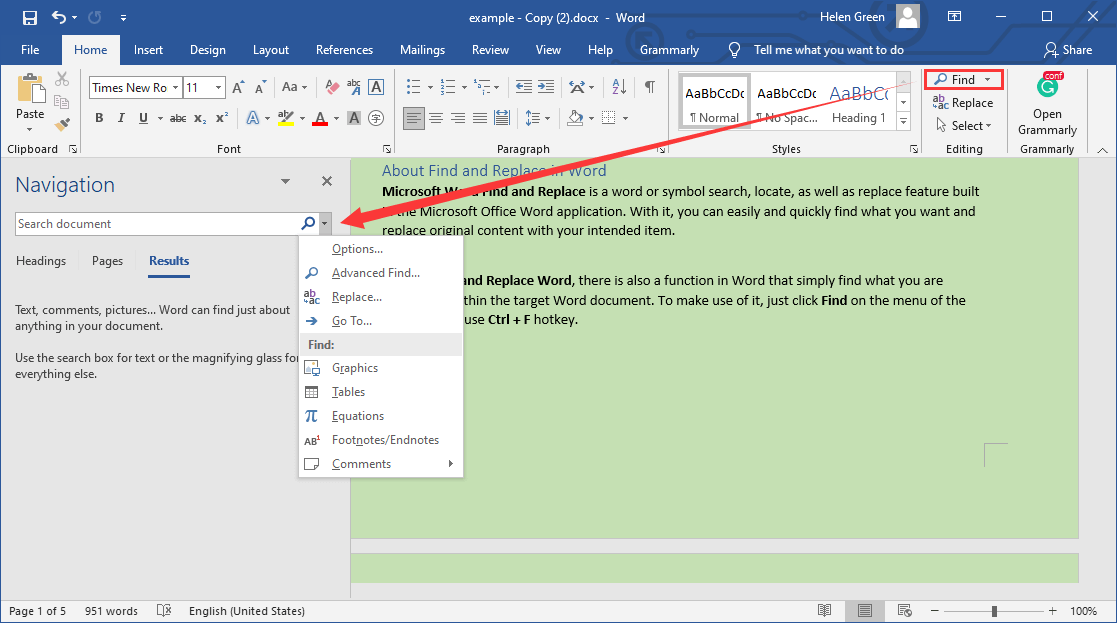
Besides text, you can also find headings, pages, graphics, tables, equations, footnotes/endnotes, as well as comments.
Where Is Find and Replace in Word?
the Find Replace Word is in the submenu of the Home menu on the upper of the Word file. More exactly, it locates on the upper of the Editing section, which is behind the Styles section and on the right margin if there is no additional add-in for the Word program.
How to Find and Replace in Word?
How to do find and replace in Word? Just follow the following guide.
Step 1. While you are in Word, click the Replace on the upper menu to open the Find and Replace dialog box. Or, click the inverted triangle next to the Find utility and select Advanced Find to trigger the dialog box. Or, just rely on Find and Replace shortcut key Ctrl + H.
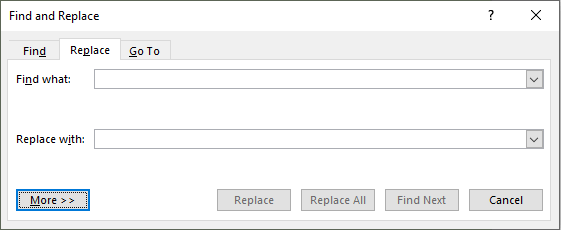
Step 2. In the Find and Replace dialog, input the content that you would like to find into the Find what column.
Step 3. Type the new content that you plan to replace the original one into the Replace with column.
Step 4. Click the Replace or Replace All button.
Replace: It will replace the next matched content with the new content searching from where you are now in the Word document (where your cursor is). If you are now at the end of the document, it will start searching back to the very beginning of the file.
Replace All: It will replace all the matched contents with the new content and tell you how many replacements are done. There is no confirmation before the replacement really takes place. So, make a check before you click the replace button.
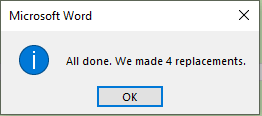
There is a Find Next button behind the Replace All button. It is used to find the next matched content without carrying out the replacement.
Moreover, you can click the More button in the bottom left to expand more advanced settings for the find and replace in Word function.
Search: You are able to search the target content from the All (default) content, starting from the current location (cursor) Up, or Down.
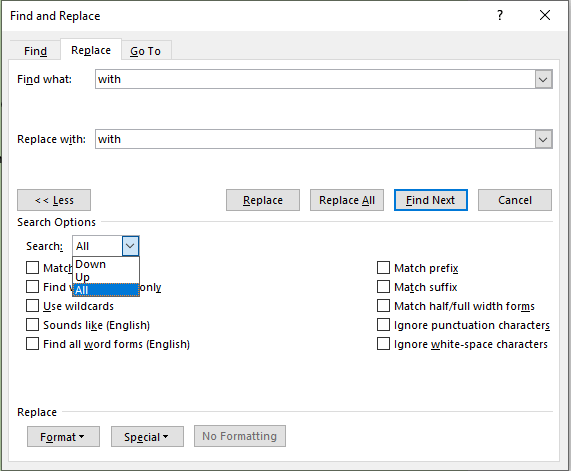
Match case: Find and replace the content with case sensitive.
Find whole words only: Only find the matched words, exclude the matched part of a word to avoid partial matches. That is to say, if part of a word matches the target content, this part will be jumped over. For example, if you are searching for “with”, it will only find the word “with” for you, the words contain “with” like “within” will not be shown to you.
Use wildcards: You can use wildcards like * to help you find partially matched contents. For instance, you can rely on “with*n” to find “within”, “with the new”, “with column” and so on in this article.
Sounds like (English): When you search a word with this option, it will find only not the same words but also the words that sound like the target word for you. For example, if you search “at” in this article, it will also find “it”, “out” and even “add” for you. Yet, this option is only available for English content.
Find all word forms (English): It will get you not only the word “match” but also “matched” and “matches” in this post.
Match prefix: With this option, you can additionally find words that have the same prefix as the target word.
Match suffix: with this option, you are able to find extra words that have the same suffix as the target word.
Match half/full width forms: Search the content that has the same half/full width forms as the target content.
Ignore punctuation characters: If there are punctuation characters in the target content, when you search in the document, just ignore the punctuation characters.
Ignore white-space characters: When searching for the matched contents for the target content, just ignore the white-space characters in the target content if there are.
Under the Replace advanced settings, you can specify the Format (font, paragraph, tabs, language, frame, style, and highlight) and many Special items (paragraph mark, tab character, caret character, etc.). also, you can remove all formats by clicking No Formatting.
Find vs Replace on MS Word
In general, Find only finds the contents that match the target content; while Replace will not only find the matched contents but also replace them with the new content. From the above Find and Replace dialog, you can switch to the Find tab to specify the settings only for finding. Most of the settings are the same as those in the Replace tab.
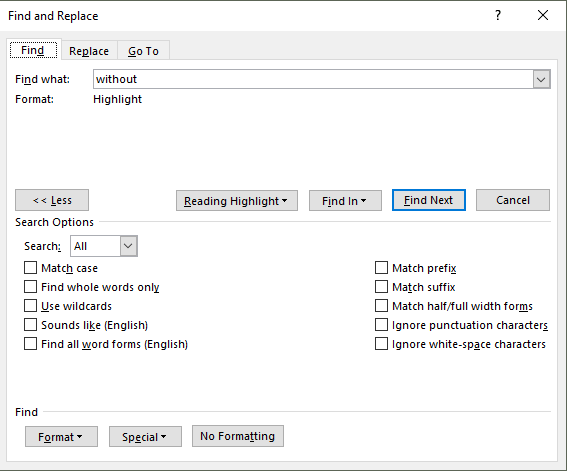
Those are all the aspects of Find and Replace in Word here. Until now, I believe you have a more thorough understanding of find/replace in Word.
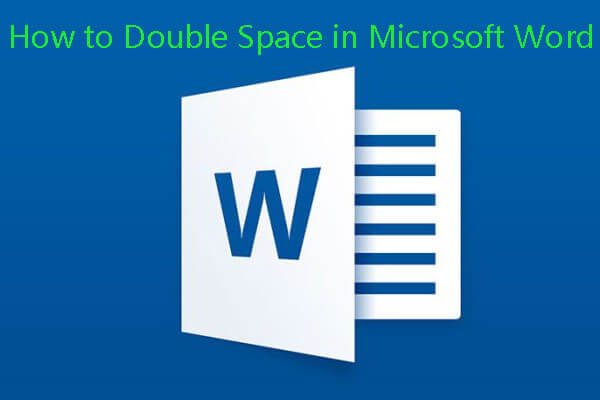
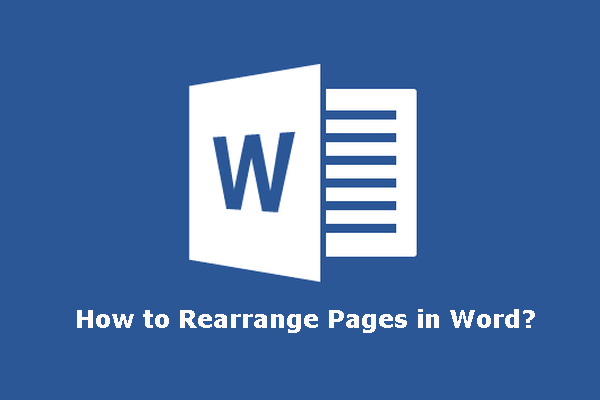
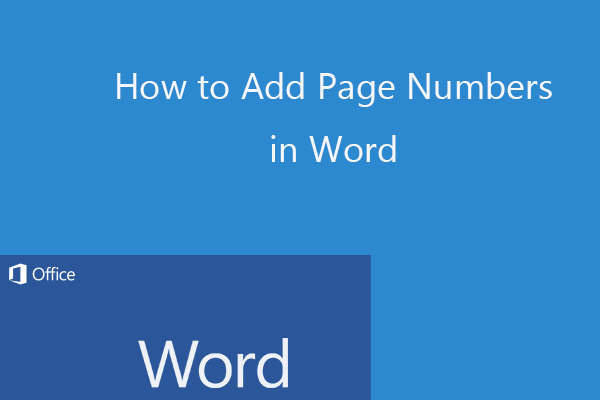

User Comments :